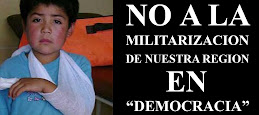CHILE SENATORS PRESENT “PRO DAM” RESOLUTION
Written by Benjamin Witte
Monday, 12 May 2008
http://www.patagoniatimes.cl/content/view/502/1/
The Pascua, one of two rivers targeted by HidroAysén project.
Photo by Benjamin Witte
HidroAysén Opponents Say Resolution Is "Hypocritical"
Four of Chile’s most influential senators are hoping Congress will soon
pass a non-binding resolution defending the country’s right to develop
hydroelectric projects. The motion – presented last week by Senate
President Adolfo Zaldivar, an independent, National Renovation Sens.
Andrés Allamand and Antonio Horvath, and Christian Democratic Sen.
Eduardo Frei Ruiz-Tagle – is widely interpreted as supporting the
controversial HidroAysén dam project.
The resolution recognizes the importance of hydroelectric generation for
Chile’s “progress.” It also criticizes what the senators claim to be
unwanted interference by foreign environmental interests. The Senate is
expected to vote on the issue sometime later this week.
“There is an intense publicity campaign both in Chile and abroad to
block development in the country of hydroelectric generation projects,”
the resolution reads. That campaign, the document goes on to say, “is
organized by outside organizations and foreign individuals whose
explicit goal is to interfere in the national energy policy.”
The resolution defends the Chilean government’s ongoing efforts to
diversify the country’s electricity matrix and invest in renewable
sources of energy. Diversification should include continued development
of the country’s vast hydroelectric potential, the senators insist.
“Hydroelectric energy is a competitive, low-impact alternative (to
fossil fuel-based electricity) that can be taken advantage of in the
short and medium term,” the document reads.
The non-binding resolution appears to defend the embattled HidroAysén
dam project, slated for far southern Chile’s Region XI (Aysén).
HidroAysén is a joint entity created by Spanish-Italian electricity
giant Endesa and Colbún, a Chilean company. Together the powerful
utilities plan to build five dams – two along the Baker River and three
along the Pascua – that combined would represent some 2,750 MW of
potential electricity.
The motion is also seen as a direct attack on high-profile U.S.
environmentalists such as Robert F. Kennedy Jr. and Douglas Tompkins,
known critics of HidroAysén’s estimated US$3 billion plan. The project,
say Tompkins, Kennedy Jr. and other members of the so-called Patagonia
sin Represas (Patagonia without Dams) campaign, will devastate the
pristine Baker and Pascua Rivers.
Even more worrisome, say critics of the project, is a proposed
2,300-kilometer transmission line that would be needed to carry the
electricity from Region XI to energy hungry central Chile. The power
line, they say, would cut through countless acres of both protected and
unprotected wilderness area and pave the way for future industrial
development in the region.
“This is a mega-monster project,” Tompkins told the Patagonia Times
earlier this year. “They’re talking about running these friggin’ power
lines all the way up to Santiago and they’re going to disfigure the
landscapes between here and there. And they’re winding all over. You
should see a copy of the proposed (route). It’s a spaghetti type of thing.”
The “pro-dam” resolution is being hotly contested by HidroAysén’s many
critics, who consider it hypocritical that Sens. Horvath, Zaldivar,
Allamand and Frei object so strongly to the U.S. environmental lobby yet
apparently welcome the presence of Endesa and other foreign companies.
In a public declaration issued this past Sunday, a group of 40 different
environmental, Mapuche and other citizen groups lambasted Sens. Horvath
and Zaldivar (who represent Region XI) for turning a “deaf ear” to their
constituents.
“It’s paradoxical,” the groups went on to say, “that people who accept
the fact that our water – a strategic and national asset that’s used by
everyone – is concentrated in the hands of private multinational
electric companies would criticize those Chileans and foreigners who, in
an effort to protect the ecosystems on which present and future Chileans
will depend, want (the water) to be returned to Chilean hands.”
Before moving ahead with the polemical dam project, HidroAysén must
first gain approval from the government’s National Environmental
Commission (CONAMA). The company, which hopes to begin construction
before the end of the decade, says it will hand CONAMA a requisite
environmental impact report later this year.
By Benjamin Witte ( benwitte@santiagotimes.cl
Mapuche International Solidarity Network
mapucheinternationalsolidarity@gmail.com
Tuesday, May 13, 2008
Subscribe to:
Post Comments (Atom)









No comments:
Post a Comment